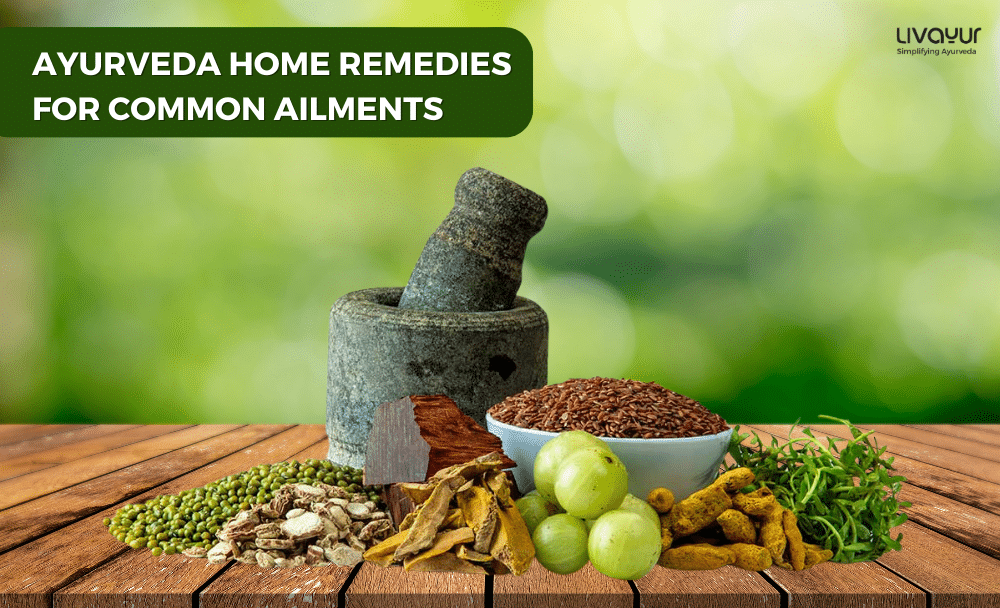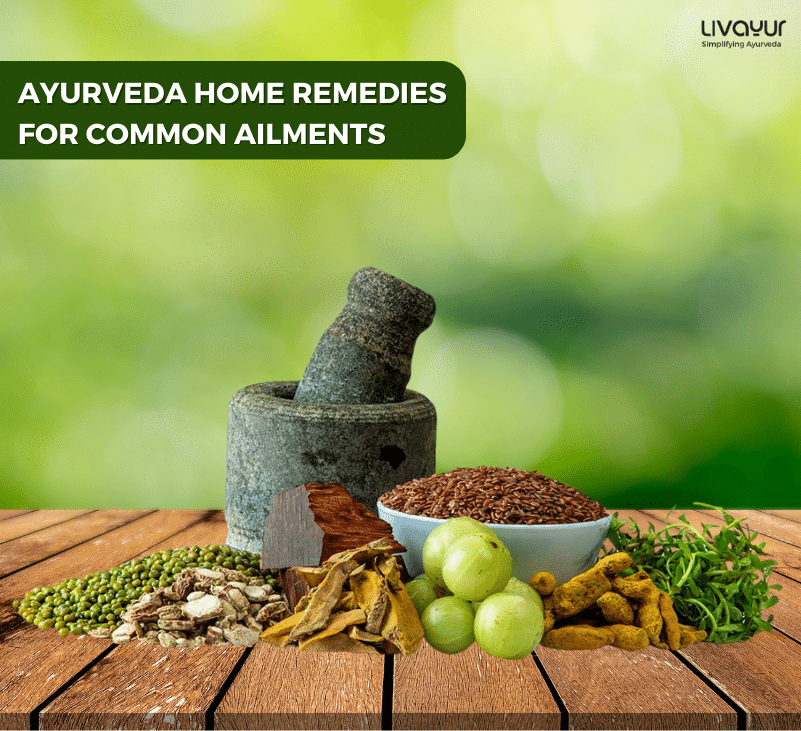
Faulty food habits and poor lifestyle choices often trigger various diseases in our body. These ailments disrupt our daily bodily functions and hinder us from leading an active lifestyle. [1]
Ayurveda, provides a holistic approach to not only combat these ailments with effective home remedies, but also ensures a stronger immune system with long term benefits.
Perceiving ailments through the lens of Ayurveda
Ayurveda says that ailments of the body are caused due to an imbalance in the Doshas. [1] Doshas, translating to that which can cause problems, are believed to be the fundamental substances present in each body that can fluctuate and thus determine the changes in growth, age, disorders and proper bodily functions. [1]
Since the Doshas are the custodians of good health and wellbeing, an imbalance in the Doshas disrupts your wellness and causes ailments.
The Doshas in Ayurveda are governed by the elements, namely, water, earth, fire, space and air. [1] They are as follows:
- Kapha – corresponding to water & earth
- Pitta – corresponding to fire & water
- Vata – corresponding to air & space
Home remedies in Ayurveda for some common Ailments
Some of the ailments that people acquire are seemingly common, but their recurrence may prove them hazardous and eventually chronic. These common ailments are mostly a result of everyday lifestyle challenges like emotional stress, overworking, exposure to a harmful environment, improper food habits and not working towards physical fitness.
The most common ailments are:
- Headache
- Cough
- Acidity
- Constipation
- Skin irritation
Headache
Headaches are often a result of the Vata imbalance or a combination of Vata and Kapha imbalance. Add to that the surrounding stress, everyday routine and ill-maintained lifestyle. Headaches can be mild or severe, could be frequent or occasional.
Ayurvedic home remedies for headaches:
- Ginger
A very common beverage consumed in Indian households is tea, specifically one with ginger infusion. Ginger extract – raw, powdered, pestled, or juiced – has been used to alleviate headaches from time immemorial. Ginger is a powerful ingredient in Ayurveda that has been known to relieve nausea, reduce pain and detoxify the body. These features make it an excellent remedy to combat headaches. [2] [3]
- Ashwagandha
Ashwagandha is one of the most powerful herbs used in Ayurveda that has several wide uses to treat various ailments.
Known to revitalise, increase strength and have anti-inflammatory properties, ashwagandha root powder, decoction paste, or Ayurvedic medication containing the herb itself prove beneficial in lowering stress levels that majorly trigger severe headaches. [4]
- Brahmi
Brahmi, like Ashwagandha, used for over 2000 years in Ayurveda is regarded as the herb to treat the mind based on the Sushruta Samhita.
With its analgesic properties, Brahmi is known to reduce stress levels and relieve headaches. [5] Aside from external application, Brahmi can also be consumed orally in the form of Ayurvedic medicines.
Cough
The main causes for cough are sinusitis, respiratory tract infections, environmental pollutants, respiratory inflammation caused by allergens, etc.
Prana Vayu and Udana Vayu (types of Vata) govern the respiratory system. When allergens interrupt them, irritation occurs. As a counter mechanism, the body forcibly expels air to remove the obstruction. During this process, the Vata (biological air) balance in the body gets impaired and causes prolonged coughing.
Ayurvedic home remedies for cough:
- Honey
Honey is known for its antibacterial and anti-inflammatory properties and has been a popular Ayurvedic ingredient in relieving a sore throat. [6]
A common ingredient in cough syrups, consumed with warm water and a hint of lemon or ginger, honey reduces irritation and improves recovery from cough.
- Ginger
Gingerols, an active component of ginger, with its anti-inflammatory and antioxidant properties enable faster relief for cough. Ginger helps in dilating bronchial muscles, relaxing the airway to reduce inflammation and help with breathlessness. [7]
Mixing ginger juice with warm water and a teaspoon of honey, adding ginger to tea are some of the common home remedies to combat a sore throat with ginger.
- Eucalyptus Oil
Eucalyptus or nilgiri is known for its antimicrobial and anti-inflammatory properties that is used for the treatment of dry coughs. [8] Mouth gargles with 2 drops of Eucalyptus infused in warm water and salt can relieve sore throat.
Steam inhalation is one of the popular remedies to resolve sore throat. Infuse 2-3 drops of Eucalyptus oil in boiling water and inhale the steam to treat dry cough.
Acidity
External stress, spicy food habits, leads to imbalance in the Pitta Dosha is the main causative factors of Acidity. The stomach normally secretes acid that is essential in the digestive process. When there is excess production of acid in the stomach, it results in the condition known as acidity.
Ayurvedic home remedies for acidity:
- Fennel
Directly chewing fennel seeds after meals is a popular practice in Indian households around the globe.
Mouth fresheners contain fennel seeds because fennel seeds relax the stomach walls, are a digestive aid and provide instant relief from acidity or acid reflux. [9]
- Coconut Water
Coconut water is a cooling, easy to digest electrolyte that alleviates acidity problems. It is also useful in the treatment of diarrhoea. [10]
According to Ayurveda, a glass full of coconut water pacifies the Pitta Dosha and acts as the best home remedy for acidity.
- Amla
This is the main ingredient of many Ayurvedic remedies of acidity. Amla is a natural coolant, pacifies the Pitta dosha, and is beneficial in treating digestive tract diseases.
Its mild laxative action helps relieve constipation that can cause acidity and other digestive issues. [11]
Consumption of Amla is known to decrease gastritis or acidity significantly.
Constipation
Ayurveda states that constipation is the result of an imbalance in the Vata Dosha. Due to low intake of water, fibre and essential nutrients, the intestines tend to absorb water from the waste matter about to be expelled from the body. This results in uneasy stool passage and thus constipation.
Ayurvedic home remedies for constipation:
- Haritaki
A noteworthy herb in Ayurveda known for its digestive health benefits. With its laxative property, Haritaki enables a relief to constipation. Consume Haritaki powder with warm water, jaggery, sugar or honey based on the season and resolve constipation. [14]
- Garlic
Garlic and its preparations are known for multiple purposes. It is not only used in treatment of constipation, but also arthritis, toothache, chronic cough. It ensures easier digestion and promises good gut health. [12] [13]
Garlic is enriched with functional fibres on which good bacteria feeds. This in turn enhances the growth of good bacteria in our stomach that ensures proper digestion of food, thus resulting in proper expulsion of waste from our body.
- Psyllium or Isabgol
Psyllium husk or isabgol is a soluble fibre that works as a gentle bulk-forming laxative that passes through the gastrointestinal tract without being broken down completely. This adds bulk and mucilage to stools, providing relief from both diarrhoea and constipation. [15]
Ensure to begin with smaller dosages, as a sudden increase in fibre intake could worsen constipation. [15]
Skin Irritation
Lack of maintenance in any of the three Doshas (Vata, Pitta, Kapha) can be the cause of skin disorders. This imbalance may occur due to dietary problems or lifestyle issues.
Ayurvedic home remedies for skin irritation:
- Neem
With antihistamine and anti-inflammatory properties, neem leaves or paste is a coolant used to improve skin irritation during an infection and also chickenpox. [16]
With neem being the main ingredient in many Ayurvedic skincare products, its cooling properties provide an instant relief to any kind of skin itch or irritation.
- Aloe Vera
Aloe gel contains about 98.5 % – 99.5 % water along with glycoproteins, flavonoids, tannins, vitamins, enzymes, and sterols, which contribute to its anti-inflammatory effects. [17]
The clear gel visible when you cut the Aloe leaf can be used to soothe itchy and irritated skin. It’s best to wash and dry the affected area before application to enable maximum absorption. [18]
- Coconut oil
Coconut oil is safe and gentle on inflamed skin and you can use it as a natural moisturiser on the affected areas of skin, whether over your body or the scalp.
Virgin (unprocessed) coconut oil is the best choice because it retains its antioxidant and antimicrobial properties. [19]
Ayurvedic home remedies for common ailments are helpful in curing as well as preventing these ailments in the future. Since these are ingredients commonly found in the kitchen, implementing these ingredients into your everyday lifestyle will drastically improve your bodily functions and ensure an active, ailment-free life ahead.

























